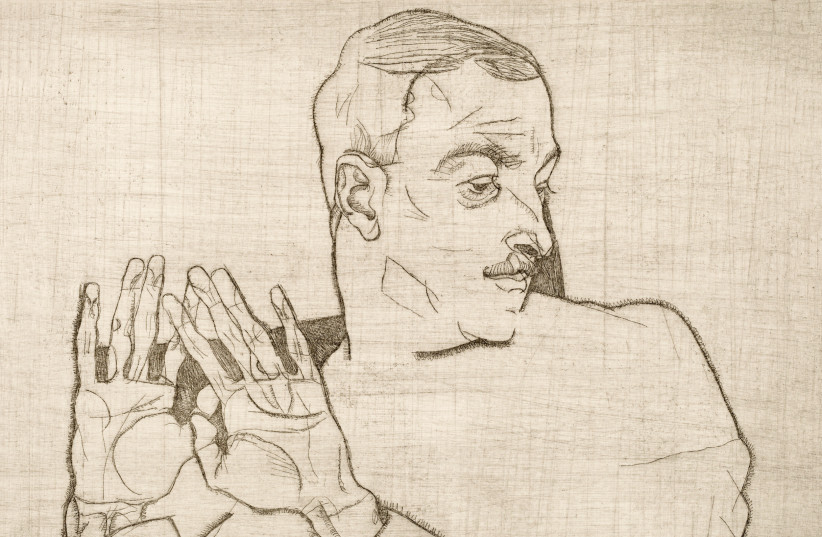For decades, the heirs of Viennese Jewish cabaret performer Fritz Grünbaum have sought the restitution of his extensive art collection, which was pilfered by the Nazis.
This year, they have seen a spate of success. The return of two portraits by Austrian expressionist Egon Schiele was announced on Wednesday, two weeks after Grünbaum’s heirs repossessed seven other Schiele works from a number of prominent museums and collections in New York City.
The heirs credit this accomplishment to Matthew Bogdanos, who founded and leads the antiquities trafficking unit in the office of Manhattan District Attorney Alvin Bragg. In addition to working on Holocaust-era art restitution, Bogdanos, an assistant district attorney, has repatriated more than 1,000 antiquities since he founded the unit in 2017.
“It takes courage to take on important American institutions,” Ray Dowd, the attorney for Grünbaum’s heirs, told the Jewish Telegraphic Agency. “And a prosecutor who’s willing to do that is exceedingly rare.”
Two more paintings to be returned
The two paintings whose return was announced this week — “Girl With Black Hair” and “Portrait of a Man” — were housed at Oberlin College and the Carnegie Museums of Pittsburgh, respectively. In September, the group of seven Schiele paintings and drawings were returned in an emotional ceremony at Bragg’s office. Another two pieces were returned to the family in 2018 via a civil ruling in the New York Court of Appeals and were put up for a charity auction through Christie’s in 2022.

“I am pleased these two pieces are being returned to the family of Fritz Grünbaum following a criminal investigation by my Office,” Bragg said in a statement this week. “The evidence makes clear the two drawings were stolen by the Nazis and subsequently transported into Manhattan, before landing in these museums. We are proud to have now returned nine Egon Schiele drawings to Mr. Grünbaum’s relatives and continue to reflect on his indelible legacy.”
Grünbaum and his wife Elisabeth were killed in the Holocaust, and the restitution of his art collection, which contained a total of 81 Schiele works, has been a decades-long process. Once the provenance of the works has been established — which is itself a challenge — lawyers must compel the institutions that hold the pieces to return them.
The co-executors of Grünbaum’s estate, Timothy Reif and David Frankel, are the second generation of heirs involved in the restitution of Grünbaum’s art collection. Reif’s mother, Rita Reif, who died in June, was a New York Times columnist on antiques and auctions, and she later took on the mission of reacquiring the artworks that were looted from Grünbaum. Her husband Paul Reif, who died in 1978, was a composer from Vienna who was Grünbaum’s cousin and co-wrote operettas with him.
At first, the restitution effort focused on civil litigation, but the recent string of success has come after a turn to criminal proceedings. Twenty-five years ago, the heirs had also found some success in criminal court, when the D.A.’s office issued a subpoena preventing the transfer of two Schiele works from the Museum of Modern Art to a museum in Austria. The office began a criminal investigation into the pieces’ provenance and they were both seized, but neither went back immediately to the Grünbaum heirs. One of the two was eventually returned in 2019.
Working on behalf of the family since 2005, Dowd said that the shift from civil to criminal cases has moved the restitution process along much quicker. But the judge’s order from the 2018 civil case also helped move the criminal investigation along.
Following the 2018 ruling, the D.A.’s office began investigating, “and then they dug deeper than we ever did,” Dowd said. “There’s only so much civil lawyers can do. So it’s not like I handed them a case tied up in a bow.”
At the head of that investigation was Bogdanos, a homicide prosecutor and retired Marine colonel whose office has recovered more than 4,500 items stolen from more than 30 countries, valued at over $410 million, according to the D.A. What started as a unit of one employee has since grown to a team of 18.
When it comes to the Schiele works, too, he has reached beyond Manhattan. While the seven pieces returned to Grünbaum’s heirs last month were all on display or held in New York City-based museums or galleries, the two drawings returned Wednesday came from institutions outside of the five boroughs. But the Manhattan district attorney’s office can still claim jurisdiction.
“If it passes through New York, we have jurisdiction no matter where it is now,” Bogdanos told CBS News in March. “If the wire transfer was made in New York, we have jurisdiction, no matter where it is now; if it was offered for sale, if it was shown at an auction. So, sure, my jurisdiction is limited to New York City. But to update a phrase, all roads lead to New York.”
Dowd attributed Bogdanos’ record to his military background, interest in history and the classics, and his nonfiction book, “Thieves of Baghdad” — an account of his own experience recovering thousands of artifacts stolen from the Iraqi National Museum after the United States invaded Iraq in 2003.
“It’s not just some lightweight chasing down pretty pictures because he likes to look at artworks,” Dowd added. “There’s a real unique and deep dedication that goes into this.”
